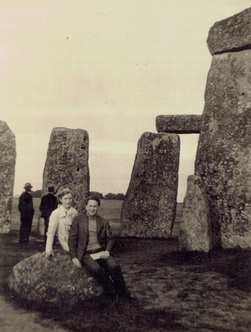 Dad and friend at Stonehenge, 1920s
Dad and friend at Stonehenge, 1920s The violent disruption of their lives by the savagery of strangers, who have the advantage of better technology, is a sad fore-runner of conquests to come throughout mankind's ensuing history; yet, the new people are not two-dimensional baddies - Golding concludes the book with a chapter from their viewpoint.
The writing is captivating - all the more amazing, when you read in John Carey's introduction, that Golding wrote this (published in 1955) and each of his first four novels during lunch hours, breaks and holidays while teaching at Bishop Wordsworth's school in Salisbury.
My son lent me his copy of The Inheritors. He is fascinated by prehistoric man. I sometimes wonder if this interest was sparked by a weekend jaunt we had when he was a small boy. We had, at that time, little cash, but we spent lots of time in free museums, walking in woods, visiting old churches etc. One summer Saturday morning we set off early for Salisbury, where we ate lardy cake in the bustling market, looked round Salisbury Cathedral, visited Stonehenge, looked for Hayter ancestors in the graveyard at Winterbourne Stoke, and spent the night in Amesbury. The next day we saw Silbury Hill, the Neolithic tomb at West Kennet Long Barrow, and Avebury Circle before driving back to East Sussex. Enough to fire any child's imagination if he or she is lucky enough to possess an unspoilt capacity for wonder! My son is an artist and art teacher today, and this year his pupils have made their own cave paintings and clay facsimiles of prehistoric tools, and were treated to a demonstration by a master flint-knapper. While they painted, Tom read instalments to them from Michelle Paver's Wolf Brother, a wonderful evocation of a boy's adventure 6,000 years ago. I understand the children were captivated by the story.
The Inheritors is a book that demands one's full attention, which it richly deserves. It whets the appetite for more of the good stuff: I've been to my bookshelf to look out my copy of Golding's Lord of the Flies, read at school but not for decades, and also Clive King's classic Puffin Stig of the Dump, about a caveman encountered by a small 20th Century boy.
Long live story-tellers!

 RSS Feed
RSS Feed
